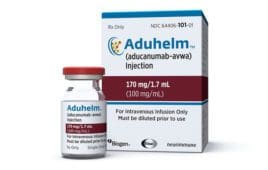 While sales of Biogen’s Alzheimer’s drug Aduhelm (aducanumab) could increase if CMS decides to back the drug, few patients are currently receiving the therapy.
While sales of Biogen’s Alzheimer’s drug Aduhelm (aducanumab) could increase if CMS decides to back the drug, few patients are currently receiving the therapy.
Approved in June under FDA’s accelerated review pathway, the drug has generated $2 million in sales to date. Of that sum, $300,000 came from the third quarter.
Analysts had expected the drug to be a blockbuster. “We are obviously disappointed with the delayed uptake of Aduhelm in the U.S.,” said Biogen CEO Michael Vounatsos in an earnings call. The company continues to believe in Aduhelm’s long-term potential, Vounatsos added.
Biogen’s revenues in Q3 also fell beneath the consensus forecast, but earnings per share exceeded expectations.
There are currently roughly 120 sites administering Aduhelm across the country, and “many more sites [are] in progress,” Vounatsos said.
One factor that may help boost uptake is if the drug receives a positive peer review. Biogen submitted a manuscript to an unnamed “top-tier” medical journal in August. While it is clear that the drug is efficacious at clearing amyloid plaque from the brain, Aduhelm’s impact on cognition in patients with mild cognitive impairment and mild dementia stemming from Alzheimer’s disease is more ambiguous.
Biogen argued that a post-hoc analysis of Phase 3 data suggested a positive clinical impact of the drug. In 2019, the company had terminated the Phase 3 EMERGE and ENGAGE based on futility analyses. Biogen later concluded that the drug met pre-specified primary and secondary endpoints in the EMERGE trial. In its Q3 earnings presentation, the company explained that high-dose aducanumab in the EMERGE trial reduced clinical decline based on primary and secondary endpoints.
Data from another Phase 3 trial known as ENGAGE were not encouraging. “In ENGAGE, aducanumab did not reduce clinical decline,” the company explained in its Q3 presentation.
The company also provided additional data to FDA during the approval process. “Overall, the approval of Aduhelm was supported by a significant dataset from eight studies with more than 3,000 patients, and we look forward to continuing to generate additional data to support the clinical profile of Aduhelm,” Vounatsos said.
While FDA agreed to use amyloid reduction as a surrogate endpoint when reviewing Aduhelm Phase 3 data, the accelerated review pathway gives the agency to rescind approval if it believes later data warrant such a decision.
Biogen submitted a draft protocol to the FDA for a Phase 4 Aduhelm confirmatory study in October.
Another potential concern is Aduhelm’s potential to cause significant side effects, including amyloid-related imaging abnormalities (ARIA) and allergic reactions in some patients.
Nevertheless, few treatments are available for Alzheimer’s disease, and long-term demand for therapies that offer hope for the debilitating conditions will likely be significant.
Filed Under: Neurological Disease





Tell Us What You Think!
You must be logged in to post a comment.